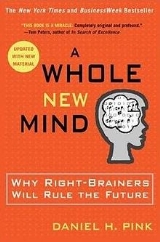
A Whole New Mind
Encyclopedia
A Whole New Mind: Why Right-brainers Will Rule the Future is a book by Daniel H. Pink
, author of Free Agent Nation. A Whole New Mind posits that the future of global business belongs to the right-brainers.
The fourth stage is where Pink focuses on how businesses can be successful.
Pink references three prevailing trends pointing towards the future of business and the economy: Abundance (consumers have too many choices, nothing is scarce), Asia (everything that can be outsourced, is) and Automation (computerization, robots, technology, processes). This brings up three crucial questions for the success of any business:
When these questions are present, creativity becomes the competitive difference that can differentiate commodities. Pink outlines six essential senses:
bestseller that has been translated into 20 languages. The book was named Best Business Book of 2005 by Strategy + Business, The Miami Herald
, 800-CEO-READ, and Fast Company
.
The book is part of a general movement in management literature to increasingly accept creativity
and innovation
as a source of business value.
ISBN 1-59448-171-7 (paperback) 2006.
Daniel H. Pink
Daniel H. Pink is an American author and journalist. From 1995 to 1997, he worked for Vice President Al Gore in the capacity of chief speechwriter, and before that as an aide to Secretary of Labor Robert Reich.- Personal history :...
, author of Free Agent Nation. A Whole New Mind posits that the future of global business belongs to the right-brainers.
Key concepts
A historical narrative starts the book outlining four major 'ages':- Agricultural Age (farmers)
- Industrial Age (factory workers)
- Information Age (knowledge workers)
- Conceptual Age (creators and empathizers)
The fourth stage is where Pink focuses on how businesses can be successful.
Pink references three prevailing trends pointing towards the future of business and the economy: Abundance (consumers have too many choices, nothing is scarce), Asia (everything that can be outsourced, is) and Automation (computerization, robots, technology, processes). This brings up three crucial questions for the success of any business:
- Can a computer do it faster?
- Is what I'm offering in demand in an age of abundance?
- Can someone overseas do it cheaper?
When these questions are present, creativity becomes the competitive difference that can differentiate commodities. Pink outlines six essential senses:
- Design - Moving beyond function to engage the sense.
- Story - Narrative added to products and services - not just argument. Best of the six senses.
- Symphony - Adding invention and big picture thinking (not just detail focus).
- Empathy - Going beyond logic and engaging emotion and intuition.
- Play - Bringing humor and light-heartedness to business and products.
- Meaning - the purpose is the journey, give meaning to life from inside yourself.
Reception
A Whole New Mind is Pink's second book. The book is a long-running New York Times and BusinessWeekBusinessWeek
Bloomberg Businessweek, commonly and formerly known as BusinessWeek, is a weekly business magazine published by Bloomberg L.P. It is currently headquartered in New York City.- History :...
bestseller that has been translated into 20 languages. The book was named Best Business Book of 2005 by Strategy + Business, The Miami Herald
The Miami Herald
The Miami Herald is a daily newspaper owned by The McClatchy Company headquartered on Biscayne Bay in the Omni district of Downtown Miami, Florida, United States...
, 800-CEO-READ, and Fast Company
Fast Company (magazine)
Fast Company is a full-color business magazine that releases 10 issues per year and reports on topics including innovation, digital media, technology, change management, leadership, design, and social responsibility...
.
The book is part of a general movement in management literature to increasingly accept creativity
Creativity
Creativity refers to the phenomenon whereby a person creates something new that has some kind of value. What counts as "new" may be in reference to the individual creator, or to the society or domain within which the novelty occurs...
and innovation
Innovation
Innovation is the creation of better or more effective products, processes, technologies, or ideas that are accepted by markets, governments, and society...
as a source of business value.
See also
- Lateralization of brain functionLateralization of brain functionA longitudinal fissure separates the human brain into two distinct cerebral hemispheres, connected by the corpus callosum. The sides resemble each other and each hemisphere's structure is generally mirrored by the other side. Yet despite the strong anatomical similarities, the functions of each...
- Conceptual economyConceptual economyConceptual economy is a term describing the contribution of creativity, innovation, and design skills to economic competitiveness, especially in the global context.- History and background :...
- Knowledge economyKnowledge economyThe knowledge economy is a term that refers either to an economy of knowledge focused on the production and management of knowledge in the frame of economic constraints, or to a knowledge-based economy. In the second meaning, more frequently used, it refers to the use of knowledge technologies to...
Publication information
ISBN 1-57322-308-5 (hardcover) 2005.ISBN 1-59448-171-7 (paperback) 2006.
External links
- Review at 800 CEO READ
- References on AllConsuming.net for the hardback and paperback editions.
- Review on The Frugal Law Student and how A Whole New Mind Applies to Law.

